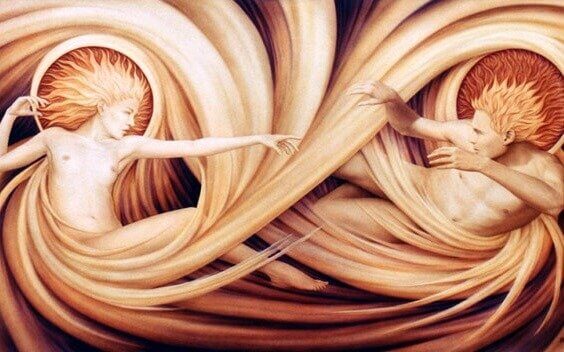The psychology of Carl Jung’s alchemy has left a legacy as fascinating as it is controversial: for the famous Swiss psychiatrist, one of the goals of human beings was his transformation into a free and individual being, but this achievement included decoding each symbol contained in our unconscious.
The subject, in itself, is not easy to understand at first, however, many of Carl Jung’s inherited theories and approaches now pose small theoretical challenges in which it is always very interesting to get involved.
- This allows us to open ourselves to new perspectives.
- Soften our approaches and enrich ourselves a little more with the legacy of one of the most controversial and interesting personalities in the history of psychology.
“Magic is just another word to define the soul”. Carl Jung?
Anyone who opens Jung Psychology and Alchemy’s book for the first time, published in 1944, will be confused. The formulas that appear on each page of this book are very bold; however, if there is one thing that defined Carl Jung, it is his great skill. approach the mystical, vague and mysterious life that transcends the psyche itself.
The psychology of alchemy is first and foremost a proposal for transformation. In this document, the most decisive factor is our intentionality and creativity, which allow us to start our “alchemist paths”. Special.
Alchemy can be assumed to be a protoscientific practice, a common ground between the mystical, the spiritual and the philosophical, which bases its origins on Hermes Trismegisto, a Greek-Egyptian philosopher. We may also keep in mind the purposes that alchemy apparently has. persecuted in the past: eternal youth or the power to turn any material into gold.
When we refer to the psychology of Carl Jung’s alchemy, it must be said that he has nothing in common with these purposes, in this case what exists is a sense of elevation, of personal evolution, so, by delving into your book Psychology and Alchemy, we will discover his interest in reviving the concept of alchemy in a passionate attempt to renew our philosophical and psychological culture.
For Jung, the knowledge of the individual himself is part of the ability to understand not only the psyche, but also every manifestation of the unconscious, and only by looking at dreams, for example, we could achieve a more holistic view of the individual. himself, a richer and deeper source to create a better version of ourselves.
Achieving true self-knowledge would therefore mean, above all, having a broader, bolder and above all profound view of the human being, as an example of this research and self-realization we have Isaac Newton.
Isaac Newton, a renowned mathematical and scientific genius, did more than develop differential calculus, discover the spectral properties of light, enunciate the theory of universal gravitation, or formulate the first calculations of the Moon’s attraction to Earth.
Thanks to him we have entered the so-called age of reason, where everything must have an adequate experimental and scientific sustenment, well, one thing that can be seen in Newton’s personal notes and diaries is that he was a great expert in alchemy. , as several articles also reveal, was his true passion.
Jung said alchemy was an art form and, therefore, it was always a science, in which all knowledge could become something much brighter and higher. As a result, Newton was able to open himself to a different kind of knowledge, in which spirituality, astronomy, symbolism, and mysticism can help form an evolved psyche.
In fact, to achieve this, it would be enough to understand some ideas, according to Carl Jung:
There are two types of alchemy. One of them strives to know the cosmos as a whole and recreate it, is, in a way, the precursor of modern natural sciences, the other alchemy would focus on the possibility of a transformation that leads us to be ourselves.
Psychology and Alchemy is volume 12 of Carl Jung’s complete work. To understand this work, let us describe the context: we are at the end of World War II and in the midst of a crisis of values, Jung was going through a personal rupture. because of their trust in the human being.
The psychology of alchemy seeks to reach the deepest essence of our being, the soul that, in one way or another, could be saved through an alchemistic process, this journey, almost as if it represented Dante’s hell, must continue to the next road. initiation, a path that began in the deepest circles, gradually emerging until enlightenment:
In conclusion, the psychology of Jung’s alchemy is a direct invitation to go beyond the most orthodox and empirical science, it was another of his attempts to make us cross the frontier of ordinary knowledge to reach the extraordinary, symbolic and spiritual essence contained in our own psyche. .
Currently, in the garden of his cottage in Bollingen, Switzerland, a large cube-shaped stone is still preserved, where it is possible to see a series of alchemist symbols that he himself has written, these symbols were revealed to you in a dream. , and it meant the following: “This is a sign to you, to remind you that you are a unit and that you are already everything in this world. “

